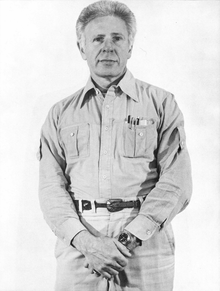Marvin Leonard Goldberger
Marvin Leonard "Murph" Goldberger (October 22, 1922 – November 26, 2014) was a theoretical physicist and former president of the California Institute of Technology.[1][2]
Marvin Leonard Goldberger | |
|---|---|
 Marvin Goldberger in 1978 | |
| 4th President of the California Institute of Technology | |
| In office 1978–1987 | |
| Preceded by | Harold Brown |
| Succeeded by | Thomas Everhart |
| Personal details | |
| Born | October 22, 1922 Chicago, Illinois, US |
| Died | November 26, 2014 (aged 92) La Jolla, California, US |
| Nationality | American |
| Other names | Murph |
| Alma mater |
|
| Known for | Crossing symmetry |
| Awards | Dannie Heineman Prize for Mathematical Physics (1961) |
| Scientific career | |
| Fields | Theoretical physics |
| Institutions | |
| Thesis | The interaction of high energy neutrons with heavy nuclei (1948) |
| Doctoral advisor | Enrico Fermi |
| Doctoral students | Martin B. Einhorn (1968) |
Biography
Goldberger was born in Chicago, Illinois. He went on to receive his B.S. at the Carnegie Institute of Technology (now Carnegie Mellon University), and Ph.D. in physics from the University of Chicago in 1948. His advisor on thesis, Interaction of High-Energy Neutrons with Heavy Nuclei, was Enrico Fermi.[3][4]
Goldberger was a professor of physics at Princeton University from 1957 through 1977. He received the Dannie Heineman Prize for Mathematical Physics in 1961,[5] and in 1963 was elected to the U.S. National Academy of Sciences. In 1965 he was elected a Fellow of the American Academy of Arts and Sciences.[6] From 1978 through 1987 he served as president of Caltech. He was the Director of the Institute for Advanced Study from 1987 to 1991.[7] From 1991 to 1993 he was a professor of physics at the University of California, Los Angeles. From 1993 until his death in November, 2014, he served on the faculty of the University of California, San Diego, first as a professor of physics and then as a professor emeritus. Goldberger also served as Dean of Natural Sciences for UC San Diego from 1994 to 1999.[2]
In 1954, he and Murray Gell-Mann introduced crossing symmetry.[8] In 1958, he and Sam Bard Treiman published the so-called Goldberger–Treiman relation.[9]
He was a participant in 1958's Project 137 and a founding member and first chairman of JASON. He was involved in nuclear arms control efforts. He also advised a number of major corporations; for example he was on the board of directors of General Motors for 12 years.[10]
Several of his doctoral students were elected Fellows of the American Physical Society: Allan N. Kaufman in 1962, Cyrus D. Cantrell in 1980, and Martin B. Einhorn in 1991.[11] Goldberger died in 2014 in La Jolla, California. His wife Mildred Ginsburg Goldberger (1923–2006) was a mathematician and economist.[12] Upon his death he was survived by two sons and three grandchildren.[2]
Bibliography
- Marvin L. Goldberger (1961). Introduction to the theory and applications of dispersion relations. Hermann. (In Relations de dispersion et particules élémentaires: École d'été de physique théorique, Les Houches, 1960)
- Marvin L. Goldberger & Kenneth M. Watson (2004). Collision Theory. Dover. ISBN 0-486-43507-5. (corrected version of book originally published in 1964)
- Francesco Calogero, Marvin L. Goldberger, and Sergei P. Kapitza (editors) (1991). Verification: Monitoring Disarmament. Westview Press. ISBN 0-8133-0965-4.CS1 maint: multiple names: authors list (link) CS1 maint: extra text: authors list (link)
References
- "Marvin "Murph" Goldberger, Array of Contemporary American Physicists". American Institute of Physics.
- Woo, Elaine (2014-11-28). "Marvin Goldberger dies at 92; physicist served as Caltech president". The Los Angeles Times. Retrieved December 1, 2014.
He left Caltech to become director of the Institute for Advanced Study, the Princeton, N.J., think tank that had been home to such luminaries as Einstein and J. Robert Oppenheimer. Goldberger held that post from 1987 to 1991, when he moved to UCLA to teach physics. He spent his last years at UC San Diego, where he was dean of the school of natural sciences from 1994 to 1999.
- "Marvin Leonard Goldberger". Mathematics Genealogy Project. Retrieved January 10, 2007.
- Goldberger, Marvin L. (1948). The interaction of high energy neutrons with heavy nuclei (Ph.D.). The University of Chicago. OCLC 44609154 – via ProQuest.
- "Dannie Heineman Prize for Mathematical Physics". American Physical Society. Retrieved January 10, 2007.
- "Marvin L. Goldberger, past director". Institute for Advanced Study.
- DePalma, Anthony (1991-06-26). "For Scholarly Nirvana, Familiar Questions as Leaders Change". The New York Times. Retrieved January 14, 2011.
Dr. Goldberger, a former president of the California Institute of Technology, is a wry man who is able, despite his revered office (it belonged to J. Robert Oppenheimer from 1947 to 1966), to poke fun at himself. Given such an independent and strong-willed faculty, he said he sees the director's job as more that of pit crew than of car driver in this intellectual road race.
- Gell-Mann, M.; Goldberger, M. L. (1954). "The scattering of low-energy photons by particles of spin ½" (PDF). Physical Review. 96 (5): 1433–8. Bibcode:1954PhRv...96.1433G. doi:10.1103/PhysRev.96.1433.
- Goldberger, Marvin L.; Treiman, S.B. (1958). "Decay of the π Meson". Physical Review. 110 (5): 1178. Bibcode:1958PhRv..110.1178G. doi:10.1103/PhysRev.110.1178.
- Aaserud, Finn (February 12, 1986). "Oral History Transcript — Dr. Marvin Goldberger". American Institute of Physics.
- "APS Fellowships". APS Physics.
- "Mildred (Ginsburg) Goldberger". Atomic Heritage Foundation.
External links
- 1983 Audio Interview with Marvin Goldberger by Martin Sherwin – Voices of the Manhattan Project
- Oral History interview transcript with Marvin L. Goldberger 12 February 1986, American Institute of Physics, Niels Bohr Library and Archives
| Academic offices | ||
|---|---|---|
| Preceded by Harold Brown |
President of the California Institute of Technology 1978 – 1987 |
Succeeded by Thomas Everhart |